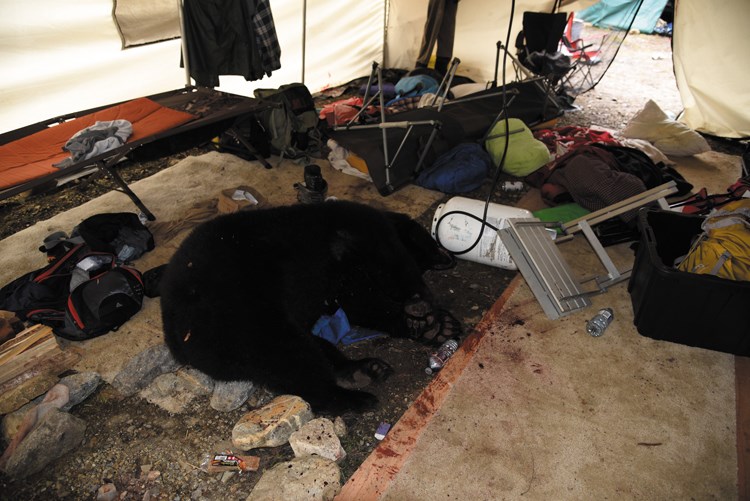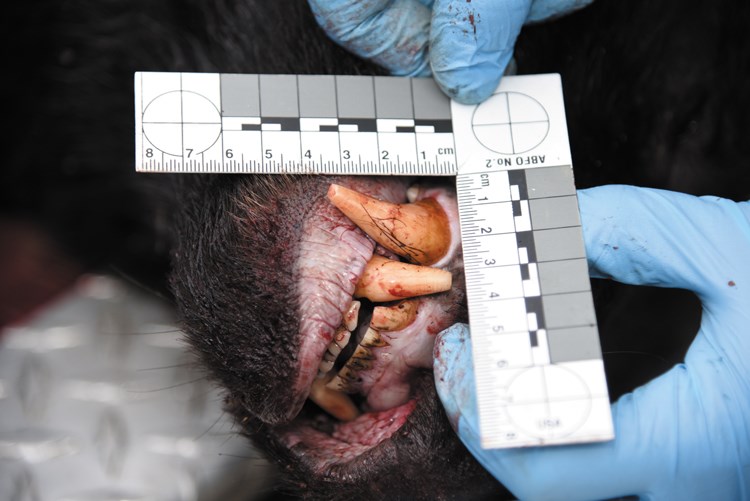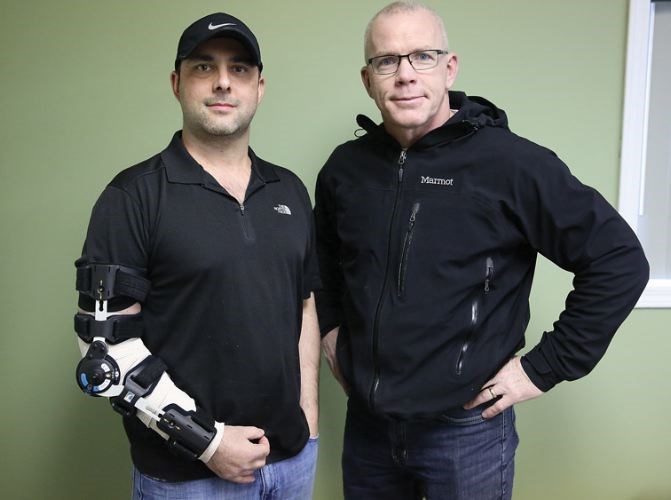To start the new year, Paul Gilbert is celebrating some new marks in his life.
One of them is a gouge in his calf muscle that other parts of his body have been used by doctors to putty in. Another is a maw mark on his shoulder only a nip away from his neck, and some streaks down the flesh of his back. Another is a gap between his biceps and forearm flexors where most people have an elbow.
Gilbert will have an artificial one soon, and the leg and neck will also be operational again once the extensive healing process is finished.
A major part of the healing is knowing how lucky he is to be involved with nurses and surgeons.
He remembers every pulse-throbbing second of how he received those wounds - all the growls and gunshots and agonizing bumps on the road between a normal day on the mountain and arriving at the University Hospital of Northern B.C. just in time.
For the first time since those moments of terror, Gilbert and his closest companion to the action, Dave Trepanier, are telling the whole story of that event - an incident that was, for them, more like a set of micro-events lasting about 600 seconds at most, plus a back road drive that seemed unending.
It all started simply enough, pleasantly enough, on a normal autumn day.
Gilbert and Trepanier love the outdoors, they love hunting moose, and they do it well. They had just completed an eight-day guiding trip into the mountainous Torpy River watershed a couple of hours northeast of Prince George with some American hunters.
They got the moose they were licensed for on that excursion, delivered the Americans back to Prince George, and had gone back out on their own. In between times, Gilbert had gotten his own moose and it was now his son's hunt they were gearing up for.
There was a round of hot showers, some grabbing of minor provisions, and they were back at their base camp.
Trepanier and Gilbert each had a teenaged son along, Jonah and Owen, plus this time their friends Dave Fuller and Neil Hanlon came along to enjoy the wilderness.
It was a social atmosphere. They laughed and chatted over a hot dinner of butter chicken and a token glass of wine, with everyone marveling, no matter how many times they'd seen it before, at the vast blanket of stars overhead.
They had an early morning ahead of them, so they cleaned up the mess tent where all food was stored, prepared and consumed apart from their sleeping quarters.
It was Gilbert's night to do the dishes, but everyone helped with some of the chores. They retired to their cozy wall-tents a distance away from their mountainside cafeteria. They were blissfully exhausted. Fuller and Hanlon went to one tent, fathers and sons to the other. Gilbert went through his nightly camp ritual of putting his flashlight, shotgun and boots beside his cot. Trepanier noted the time, 9:21 p.m., when the lamps were doused.
"I was asleep as soon as my head hit the pillow," he remembered.
The others fell into slumber just as quickly.
But they were not alone on the mountainside.
Someone else was out for a wilderness dinner that night as well, sniffing about in the darkness. If anyone had seen him, they'd have noticed an apparently healthy black bear. He was a moderate size - about 350 pounds, above average but not shocking - and athletic of build.

Like his human counterparts in the same forest, this was autumn: time to hunt. He was packing on calories and he sniffed some inside a cooler inside an uninhabited tent. But the box wouldn't open.
The bear wasn't shy about his frustration; he was dragging the thing around trying to pop the lid off.
Gilbert heard the bear rummaging up the path and the bear heard him when he spoke two words - "bear, Dave."
"He heard my voice," said Gilbert. "He came rushing. He came right inside the tent, right through the front door. I got my flashlight on, and I could see the front of his body in the doorway. I was going for my gun and he went for me."
For Gilbert, the next page of the story was a collage of pictures - close-ups of fur, teeth, rank breath, ear-splitting blasts and metallic smoke. The bear was on him, and he wasn't there to be curious and cuddly.
"When he came at me, I got my leg out and kicked at him. He bit down on my leg and lifted me up. I was just a rag doll to him," Gilbert said. "Like a dog with a dishrag, I couldn't do anything."
The bear let his leg go and did next what all predators do with the prey in their clutches. The bear mounted Gilbert like a lion on an antelope, crunching his jaws down on the small isthmus of flesh between head and body.
He missed or Gilbert's life would have finished in the next instant.
The bear didn't get the neck, with the easy snapping of the spine that would follow. The bear got Gilbert's shoulder instead, just three inches off the mark.
"I could feel the adrenalin. I could feel the shock. There was a numbness right through me. I'm yelling now, 'Shoot it! Shoot it!' and I heard the shot. I felt my arm just go flop."
For Trepanier, in the cot only a few feet away, it was a different experience. He was not oblivious to the stalker in the night. Gilbert's voice and the sudden violence was what stirred him from sleep.
The light was akimbo, the place was quaking with a death struggle, and their little tent was all chaos.
But he knew exactly what was happening and he knew exactly where he kept his .300 Winchester Magnum rifle. Trepanier dove for it, he saw the glint of the black stock in the ambient light, and somehow came up with the gun in what seemed like a flash.
"In the silhouette from the little bit of light we had, I could see the bear not just in the tent but up on top of Paul on his cot," Trepanier said. "I could see the bear's head, I could see his ears. Your instinct as a hunter is to shoot him right now, but something told me not to, or it could have gone through and killed Paul too. The bear's head was positioned right over Paul's head and neck. I changed positions to the side and when I did fire, I knew I hit the bear, but I had no idea I'd also hit Paul. I fired twice, right into him, point blank."
Just as he'd predicted, one bullet did in fact pass through the body of the bear and out the other side.
Instead of Gilbert's head being the next object in its path, the elbow was next in line. It passed through that, too, pulverizing the joint like a peanut under a hammer. Both bear and friend were severely wounded and Gilbert knew it. He understood the fight wasn't done. He had to stay focused or the bear would still finish the primal job it started. His own pain would just have to wait.
"The bear sort of fell or lurched into the corner of the tent. He was pinned there and I heard this click. The gun was empty," he said.
"I had the muzzle of the gun right on him, I could feel the softness of his flesh, and he just pushed right past me."
The bear turned back towards the tent's door.
"It was probably headed for light. He was really hurt," said Trepanier. It crawled over one of the boys still in his sleeping bag, but wide awake by now, of course. It bumbled back outside and rambled across the trail to the second tent. In it went, where the two friends were also wide awake and suddenly face to face with the assailant.
The pot-bellied stove in the first tent had been knocked over during the cage match, and Trepanier picked it up and heaved the smoking, choking hulk out of the tent the way the bear had gone.
Trepanier also followed behind with the empty rifle still clutched in his hands. If it had to become a bat or a blunt spear, so be it.
"All I could think about was keeping myself between the bear and the boys. I was close enough that if he turned back at me, he'd be on me, so I didn't dare turn my back, no matter what."
Bullets were grabbed and loaded into the rifle, but again Trepanier was faced with knowing not where people were in relation to the bear and the discharge of the firearm.
He had to watch helplessly as the bear wheeled back from the tent across the path and head straight back towards their own.
As it did so, the tent flap came open and there was one of the teenagers with Gilbert's 12-gauge shotgun in hand.
Two shots were fired.
The big gun spewed slugs right into the attacker's centre of mass as it lunged into the tent once again. The bear went down in a black heap.
"I think it's dead," said the young shooter, and he was probably right but Gilbert's voice could be heard over the din: "Forget that! Hard forward-hard back, do it again!"
The boy wracked the shotgun - a tool he'd never used before - and pumped one more blast into the bruin.
"I couldn't believe how Paul stayed in the moment like that. He wasn't just conscious, he was coaching the boys and then he was coaching me," said Trepanier.

Everyone knew Gilbert was severely injured, but it wasn't until the bear was lifeless that they discovered what Gilbert was already well aware of. His right arm was critically damaged, to say nothing of the blood leaking from his bitten neck, the claw marks on his back and the gape in his calf.
"The only thing holding his arm together was skin and hamburger, and you could see the bones," Trepanier said.
And that didn't do much to hold back the blood. Everyone pounced on the wounds with pressure and makeshift dressings, but there was only one way this story could end without a funeral - a frantic race down the long, winding, rough road back to the city.
Trepanier and Fuller jumped into the truck-turned-ambulance.
The others followed behind in a second truck.
City streets have potholes; those roads have craters. A fresh slice of pain was served up Gilbert's shredded nerve system every time the tire hit a bump, but Trepanier couldn't afford to be gentle.
He also couldn't afford to be reckless. Tires could pop, tie-rod ends could snap, control could be lost. The crisp, clear skies up in the highlands meant thick fog in the lowlands, and it clouded their travels. Gilbert could see the speedometer and grunted his worries about crashing. Trepanier marveled at his presence of mind.
"He was totally coherent, totally calm, throughout the whole thing."
There was a series of forestry roads to negotiate. None of them was short and almost every mile was cut off from cell service.
As experienced hunters, they had a satellite phone along on the trip. Trepanier knew, too, however, that a 911 call on a sat-phone was answered by a national dispatcher in Quebec, and the predicament they were in required keen local knowledge at the other end of the line.
He dialed instead the number for the RCMP 24-hour receptionist because he knew it from memory.
He was able to convey the series of turns the emergency responders should take in order to find them in the backcountry as they drove to meet them.
He knew the usual urge was to drive the Bowron Forest Service Road but it was impassable for the injured Gilbert, so he needed paramedics to be taking the alternate Aleza Lake-Willow River route instead.
The time on the sat-phone record for that first emergency call was 10:10 p.m.
As the crow flies, the distance is less than 100 kilometres from downtown to their camp, but it took two hours to meander to a rendezvous point.
The veteran hunters also knew of the specific spots where cell service was possible and they skidded into those rare spots to call in to give dispatchers updates on their progress.
"I remember it all. That drive," said Gilbert. "It seemed extra long. And every little rock and pothole bumped the bones and hurt a lot."
Trepanier said there were times he was glad of the potholes, because the inflicted pain kept Gilbert alert and assured him of one more mile that his friend was hanging onto life.
"I remember finally seeing lights ahead, and I was so relieved, I thought we'd finally met up with the ambulance and then Dave told me 'No, that was just the Hansard Bridge.' I saw the floodlights, too, at the old Upper Fraser mill site. I thought that must be them, but no, it wasn't. Those moments were hard to take. I was never so happy to see red and blue lights flashing at me."
The time was 11:40 p.m. when those RCMP lights came into view.
It was only moments later when the ambulance joined them.
Showing incredible foresight, the two men said, was the paramedic who waved Jonah into the back of the ambulance to accompany his injured dad.
It was an astute move that spared both of them incredible mental anguish.
"Seeing my son and sharing a smile let him know that I was going to be okay and I felt sure that I was going to be fine and I allowed my body to relax," Gilbert said.
From then on, both men said, the pressure was off their minds.
The police, ambulance and hospital staff were so clearly competent that both accepted with confidence the medical outcomes as they came.
The one moment of panic for Gilbert was when he heard the word "amputate" slip through the knots of pain clogging his ears.
He went wild, said onlookers.
He barked for all to hear, as much as one can in that condition, that under no circumstances were doctors to remove his arm.
No matter what the medical engineering turned out to be, he wanted his broken wing to be there when he woke up from surgery. It was, and with a team of specialists in his corner, he is now on the road to recovery.
It is a longer and bumpier route than even his backwoods rescue drive, but his body is, in all likelihood, with his efforts and their expertise, going to restore him to his accustomed lifestyle although his strength and range of motion will not be exactly as before.
The mind must also heal and not just Gilbert's.
All six people in the camp were afflicted with a sudden dose of traumatic stress and their immediate families were similarly affected. The imagination has a way of putting all six in the jaws of death even though only one was literally there.
Trepanier had the additional weight of profound guilt. It wouldn't have surprised him, he said, if he had been clapped in handcuffs as Gilbert was being strapped to the stretcher.
He had shot his friend, hurt him grievously, and was punishing himself even before the police were present.
Trepanier also knows full well at the front of his mind that Gilbert is deeply grateful his friend shot the bear off his back, and is openly glad to trade an elbow for his life.
If one word could be chosen by Trepanier and Gilbert to describe that night, neither would pick "terror" or "fear" or "attack."
The word they each live by, especially now, is "gratitude."
They both know how much worse things could have gone, they both know how the bear was merely being a bear, not a monster, and how they showed each other what they were each made of to get them through an ordeal.
No one in the party of six failed the others when crisis struck.
They had a list of people to thank, for helping the troubled situation, including many for whom names were not known. Ambulance paramedics; police officers Const. Brent Moerike, Const. Jason Gillis, Const. Bryan Krampl, Cpl. Kent MacNeill and Sgt. Adam MacNeill; numerous nurses; doctors (especially Roger Purnell and David Nelson); medical imaging staff; Gilbert's employers and colleagues at Canfor and union PPWC Local 9; Immaculate Conception School (employer of Gilbert's wife Sherry); aboriginal elder Marcel Gagnon; and the party of friends who went to straighten up the camp in the aftermath, in close consultation with the RCMP and Conservation Officers.
Gilbert and Trepanier are looking forward to going back into the same woods later this year on their usual hunting excursions.



